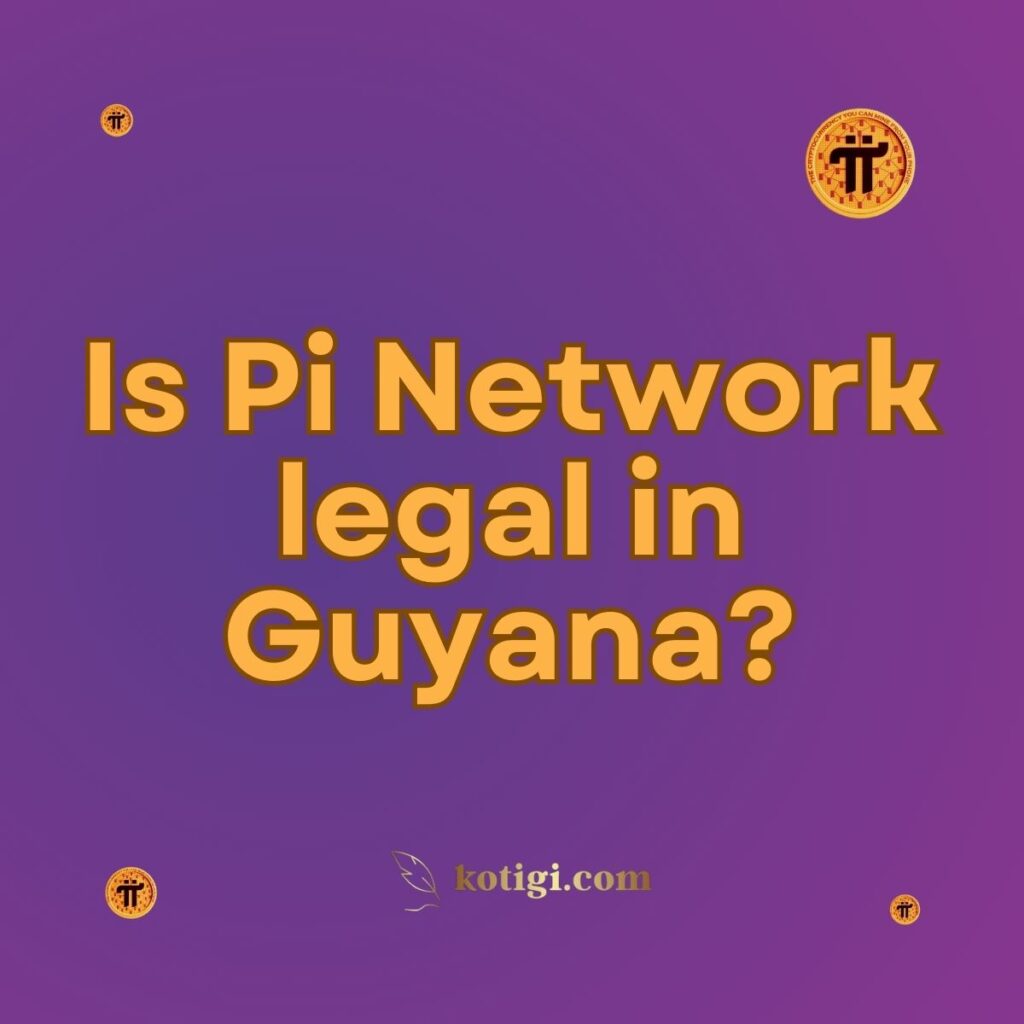
Is Pi Network legal in Guyana?
Pi Network is currently legal in Guyana, as the country has not implemented any specific regulations prohibiting its use. However, like many other nations, Guyana lacks a comprehensive legal framework addressing cryptocurrencies. As Pi Network evolves and cryptocurrencies gain more prominence globally, users should monitor the legal and regulatory developments in Guyana to ensure compliance.
Introduction
With the growing popularity of Pi Network, people in various countries are wondering about its legal status. For users in Guyana, the question arises: is Pi Network legal? Understanding the legal landscape is crucial for anyone participating in the cryptocurrency world. This article explores the current legal status of Pi Network in Guyana, the country’s broader stance on cryptocurrencies, and the potential future regulatory implications that could affect Pi Network users.
1. Overview of Cryptocurrency Regulations in Guyana
1.1 Cryptocurrency as an Emerging Market in Guyana
Guyana has yet to establish a well-defined regulatory framework for cryptocurrencies, including Pi Network. Although there are no specific regulations targeting cryptocurrency mining, trading, or use, the legal treatment of digital assets in the country remains underdeveloped. This regulatory ambiguity offers both opportunities and risks for cryptocurrency users in Guyana. At present, individuals are not prohibited from participating in Pi Network, making it legal to mine Pi and contribute to the network.
1.2 Lack of Formal Regulation for Cryptocurrencies
Unlike more developed economies, where cryptocurrency regulations are being actively developed, Guyana is still in the early stages of recognizing digital currencies. This means there are no laws explicitly banning Pi Network or similar platforms. Users can engage with the app without fear of legal repercussions, although this could change in the future if Guyana decides to regulate cryptocurrencies more stringently.
1.3 Potential for Future Regulation
As the cryptocurrency market expands, governments around the world are increasingly focused on regulating digital currencies. Guyana, though currently silent on the issue, may eventually introduce guidelines on how cryptocurrencies should be treated under the law. This could include requirements for user verification, taxation of cryptocurrency income, or regulations concerning anti-money laundering (AML) and counter-terrorism financing (CTF). Pi Network users in Guyana should stay informed about any developments that might affect their participation.
2. Pi Network’s Legal Status in Guyana
2.1 No Specific Legal Restrictions on Pi Network
Pi Network operates legally in Guyana, as there are no laws prohibiting the mining or use of cryptocurrencies within the country. Pi tokens, which are still in their pre-market phase, do not have a financial value and are not yet considered a tradable asset. Therefore, they are not subject to the same financial regulations as traditional currencies or assets. Users can mine Pi without concerns about violating Guyanese law.
2.2 Compliance with Global Cryptocurrency Trends
While Guyana does not have specific regulations in place for Pi Network, the country may eventually follow global trends as the cryptocurrency space matures. Pi Network’s decentralized nature and focus on security align with many international standards for cryptocurrency platforms. However, as global regulators focus more on cryptocurrencies, Guyana could introduce measures to ensure that users are compliant with international standards, such as Know Your Customer (KYC) requirements and anti-fraud measures.
2.3 Role of the Central Bank of Guyana
The Central Bank of Guyana has not issued any formal statements regarding the regulation of cryptocurrencies. However, given the rapid pace of technological and financial innovation, it is possible that the Central Bank will play a future role in determining how cryptocurrencies, including Pi Network, will be regulated. Users should monitor for any announcements or policy shifts from the Central Bank that could impact the legal status of Pi Network in Guyana.
3. Tax Implications for Pi Network Users in Guyana
3.1 Current Tax Treatment of Cryptocurrencies
Since Guyana has not established any laws or guidelines specific to cryptocurrencies, there is no formal tax policy that applies to Pi Network users. Pi tokens, which are not yet tradeable, do not generate taxable income, so users are not required to report any gains or earnings. However, this could change if Pi tokens become tradable assets in the future.
3.2 Future Tax Considerations for Cryptocurrency Users
As Pi Network develops and its tokens gain value, users in Guyana may eventually face tax obligations. If the government decides to treat cryptocurrencies like other assets, Pi tokens could be subject to capital gains tax or other forms of taxation. Users should be prepared for the possibility of needing to declare cryptocurrency-related earnings and consult with tax professionals to ensure compliance with future tax laws.
3.3 Taxation of Crypto Payments
In the future, if businesses in Guyana begin to accept Pi tokens as payment, Value Added Tax (VAT) or other taxes could be applied to transactions conducted with Pi. While this is speculative, it is important for users and merchants alike to remain aware of how evolving tax policies might impact the use of Pi tokens in commercial activities.
4. Potential Risks and Challenges for Pi Network Users in Guyana
4.1 Regulatory Uncertainty
One of the biggest challenges for Pi Network users in Guyana is the lack of regulatory clarity. Although Pi Network is legal for now, the government could introduce new regulations at any time, which could potentially limit or affect the way users interact with the platform. This uncertainty makes it essential for users to stay updated on legal developments related to cryptocurrencies.
4.2 AML and KYC Compliance
As global regulators continue to focus on combating money laundering and other financial crimes, cryptocurrency platforms like Pi Network could eventually be required to implement stricter KYC and AML policies. While Pi Network already has some security measures in place, users in Guyana should be prepared for the possibility of needing to provide more personal information to continue using the platform legally in the future.
4.3 Security and Privacy Concerns
Although Pi Network has a secure infrastructure, users should still be cautious when sharing personal information on any platform, especially one that deals with digital currencies. As with any online activity, there is a risk of data breaches, fraud, or misuse of personal information. Users should follow best practices for online security and privacy when participating in Pi Network.
5. Opportunities for Pi Network in Guyana
5.1 Early Adoption and Growth Potential
Pi Network presents an opportunity for Guyanese users to be part of a global movement that aims to democratize access to cryptocurrency. By joining Pi Network during its early stages, users can accumulate Pi tokens before they become widely available on the market. This offers the potential for significant rewards as Pi Network grows and its tokens gain value.
5.2 Empowering Local Businesses
In the future, as Pi Network expands and Pi tokens become more accepted, local businesses in Guyana could benefit from integrating Pi into their payment systems. This would enable merchants to tap into the global cryptocurrency ecosystem and provide customers with more options for conducting transactions. The low-cost nature of Pi’s mining model could also make it an attractive solution for small businesses.
5.3 Blockchain Innovation and Collaboration
Pi Network’s open and collaborative approach to blockchain technology presents an opportunity for local developers and innovators in Guyana to contribute to the platform. By participating in Pi’s ecosystem, they can explore new possibilities for blockchain applications, creating a stronger technological foundation within the country.
6. The Future of Pi Network in Guyana
6.1 Potential Legal Recognition
If Pi Network continues to grow and its tokens become more valuable, there is potential for formal legal recognition in Guyana. As the government establishes clearer guidelines for cryptocurrencies, Pi tokens may be incorporated into the broader regulatory framework, ensuring legal clarity for users. This could help foster greater adoption and provide opportunities for businesses to accept Pi as a valid form of payment.
6.2 Impact on Guyana’s Digital Economy
Pi Network could play a role in advancing Guyana’s digital economy by providing an easy entry point into the cryptocurrency world. As more users adopt Pi tokens and businesses begin accepting them, the platform could contribute to the growth of a vibrant digital ecosystem in the country. This would align with global trends toward digital finance and decentralized economies.
6.3 Long-Term Viability of Pi Network
While Pi Network shows promise, its long-term success depends on the platform’s ability to deliver on its roadmap and provide real value to its users. If Pi tokens become widely adopted and the platform maintains its focus on security and user engagement, Pi Network could become a viable cryptocurrency in the Guyanese market. However, users should remain cautious and ensure they are well-informed about the platform’s progress.
Conclusion
Pi Network is currently legal in Guyana, offering users the opportunity to participate in a growing cryptocurrency platform without facing regulatory barriers. However, as the cryptocurrency landscape evolves, users should stay informed about potential regulatory changes that could impact their participation. By understanding the risks and opportunities associated with Pi Network, users in Guyana can make informed decisions about their involvement in the platform.
Key Takeaways
- Pi Network is legal in Guyana, and users can participate without facing legal restrictions.
- There are no specific cryptocurrency regulations in Guyana, but users should stay informed about potential future legal developments.
- No tax obligations currently apply to Pi Network mining, but this could change as Pi tokens gain value and become tradeable.
- Potential regulatory risks include future AML/KYC requirements and evolving tax policies that could impact Pi Network usage.
- Pi Network presents early adoption opportunities for Guyanese users, with potential benefits for local businesses and developers.





